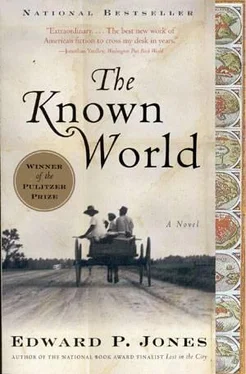In Winifred and John Skiffington’s parlor there was a wondrous-looking bookcase, lovely oak, a lion’s growling face at each edge of the top ends, three shelves, a secondhand item made by Augustus Townsend not long after Augustus bought his freedom. He had first thought he would keep it for himself and the family he would buy out of slavery, though none of them could read then. (He and Mildred would never learn to read.) He would keep it as a kind of symbol for his determination to get them. But then he realized that what he could get for the bookcase would bring his wife and child closer to him, so he put a price on it. Fifteen dollars. It had been originally sold to a man of two slaves who lost his sight and so, as he told Skiffington, lost his hunger and thirst for books. Skiffington bought it for five dollars.
Aside from the Bible, Skiffington was not much of a reader, which was not the case with Winifred. She had read so much, her husband once said, she could be a schoolteacher. All the shelves of that secondhand bookcase were full, primarily with books she had brought down from Philadelphia. Skiffington had asked that she not teach Minerva to read, but she had not been able to help herself. She had asked only that Minerva not let anyone see her reading.
Among Winifred’s treasures on the first shelf of the bookcase were Shakespeare’s complete plays in two volumes, a present from her parents, and Washington Irving’s Sketch Book, a present from Skiffington when he asked her to marry him. Irving’s book was in red leather, a beautiful second edition published in London in 1821. After supper the Skiffingtons, including John’s father, would gather in the parlor and Winifred would pick something from the bookcase and read. Skiffington himself was partial to Irving’s “Rip Van Winkle.” “You’ll wear it out, John,” Winifred would say. “You will drain all the freshness out of it.” To coax her, he would begin, “Rip Van Winkle, a posthumous writing of Diedrich Knickerbocker.”
Skiffington thought of “old Rip” when he saw the man on the steps leading up from the street to the jail. The hair on the man’s face was wild and quite abundant, and as Skiffington got closer he made out the eyes and nose and mouth poking through the hair. Only the hair told him it was a white man, because the skin was too dirty to bear witness to that. He could have been one of the mountain men who lived alone and came down every now and again just to hear human voices. The man stood up several yards before Skiffington got to the jail and he stood firm on his two feet, testifying that whatever the dirt and the hair said about him, there was a heart and a mind ready to say something different.
“John,” Counsel Skiffington said.
Skiffington stopped with one foot on the steps and the other still in the street. He studied the man for more than a minute and when the man said his name again, Skiffington said, “Counsel, that you?” He smiled and extended his hand. He had heard thirdhand that Counsel had fallen into the blaze he created at A Child’s Dream in North Carolina just after he had shot himself in the head. The bank Counsel owed had actually started that story in its attempt to provide some conclusion to the whole Counsel Skiffington affair. Among dozens of burnt bodies, who would know that one wasn’t the master of the plantation?
“It’s me,” Counsel said. “It’s me and I think I can say that and mean it.” They went on shaking hands and would have embraced but the cousins had never had that kind of love. Counsel had arrived late in the night with a man who had picked him up in Roanoke. The man was leading two wagonloads of goods-from cloth to bullets to books-to northern Virginia. Counsel had intended to accept free passage all the way to the man’s destination, but the God he found in Texas told him he might as well stop and see what might happen with John Skiffington.
“Counsel, I took you for dead,” Skiffington said. “Winifred and I took you and everybody for dead, that’s what we heard.”
“Everybody is, John. I suppose I was, too. But now I’m standing here and telling you I’m not.”
“Let me take you home to Winifred, get you cleaned up.”
“I don’t think I’m fit to meet any womenkind,” Counsel said. “Especially not one I’m related to.”
“Mrs. Skiffington wouldn’t mind.”
“I would, John. I would,” and Counsel remembered that the world had always called his wife Mrs. Skiffington. “I would mind. Maybe if you could spare me something so I could put up at the boardinghouse, I might be presentable in a day or two. A bath, some meals, and I’ll be a man ready for civilized society again.”
“There’s nothing wrong with you, but if the boardinghouse is what you want, then that is what I’ll give you.” They went two streets over and Skiffington paid for three nights at the boardinghouse.
He came by about noon and he and Counsel took dinner in the house’s small dining room. Counsel had bathed and shaved, and as he ate, the man John Skiffington loved but had had so much trouble with began to emerge. During the meal, Counsel said that he had been practically everywhere and now he did not know what to do with himself. By the end of the meal, Skiffington was asking Counsel if he wanted to be his deputy.
“You always struck me as a man who wanted the job all to himself,” Counsel said, drinking coffee. “Or that’s what I got from Belle reading Winifred’s letters to me. John Skiffington could do everything alone.”
“There gets to be more to be done. It wouldn’t hurt to have someone standing sharp at my back. Family is good for that. Good for backing you up.”
“I’ll do whatever I can.”
Counsel came to live in Skiffington’s house, shared a room and bed with Carl Skiffington, John’s father. Though he said nothing to anyone, Counsel thought himself entitled to the room that had always been Minerva’s. He did not understand why a slave girl should be put above him. A slave he himself had once owned. He suspected that there was more between her and Skiffington and that her own room was just one thing the girl had managed to wheedle out of his cousin. He had seen other white men fall prey, so why not a man who claimed so much to walk with God? After his first month’s pay, Counsel moved back to the boardinghouse, and the woman that owned the place charged him less than the other boarders, because he was the law and because he had suffered tragedies in North Carolina.
Mildred Townsend came out to the road in the morning and the evening every day after they took Augustus and waited for nearly a half hour. She knew that Augustus sometimes took on unexpected jobs when he was away from home and forgot to send word back to her that he would be home before long. At the end of each half hour she would raise her arms up high, her fingers extended, and she would feel Augustus’s spirit flow into the tips of her fingers and she would know that he was on his way. She did not worry the first week or for most of the second week. “I’ll give that man pure hell when he do show up,” she said to their dog, who came out to the road with her and waited beside her the whole time. “And you help me, huh? You help me give him pure hell.” She and Augustus had been married for more than thirty-five years, and she trusted him to be somewhere safe. She knew that with their only child gone, her husband would not do anything to put more suffering in her heart. It would be toward the end of that second week that she would go to Caldonia and they, with Fern Elston the teacher, would go to Skiffington, who would be away. But Counsel, his new deputy, would be there in the jail.
About a week after South Carolina, outside of McRae, Georgia, they camped and after Stennis had crushed up some food for Darcy, who had but two teeth in his head, Stennis fed Augustus and settled him down at an apple tree.
Читать дальше












